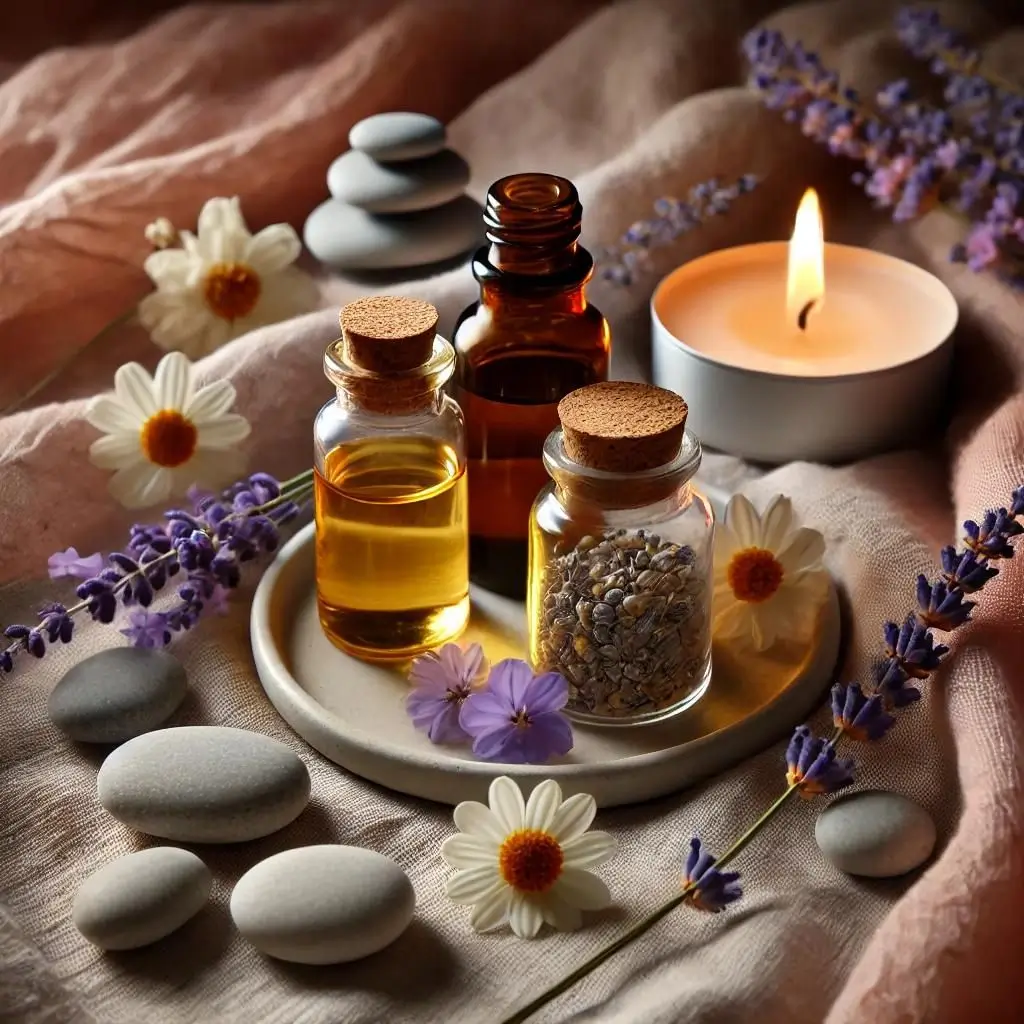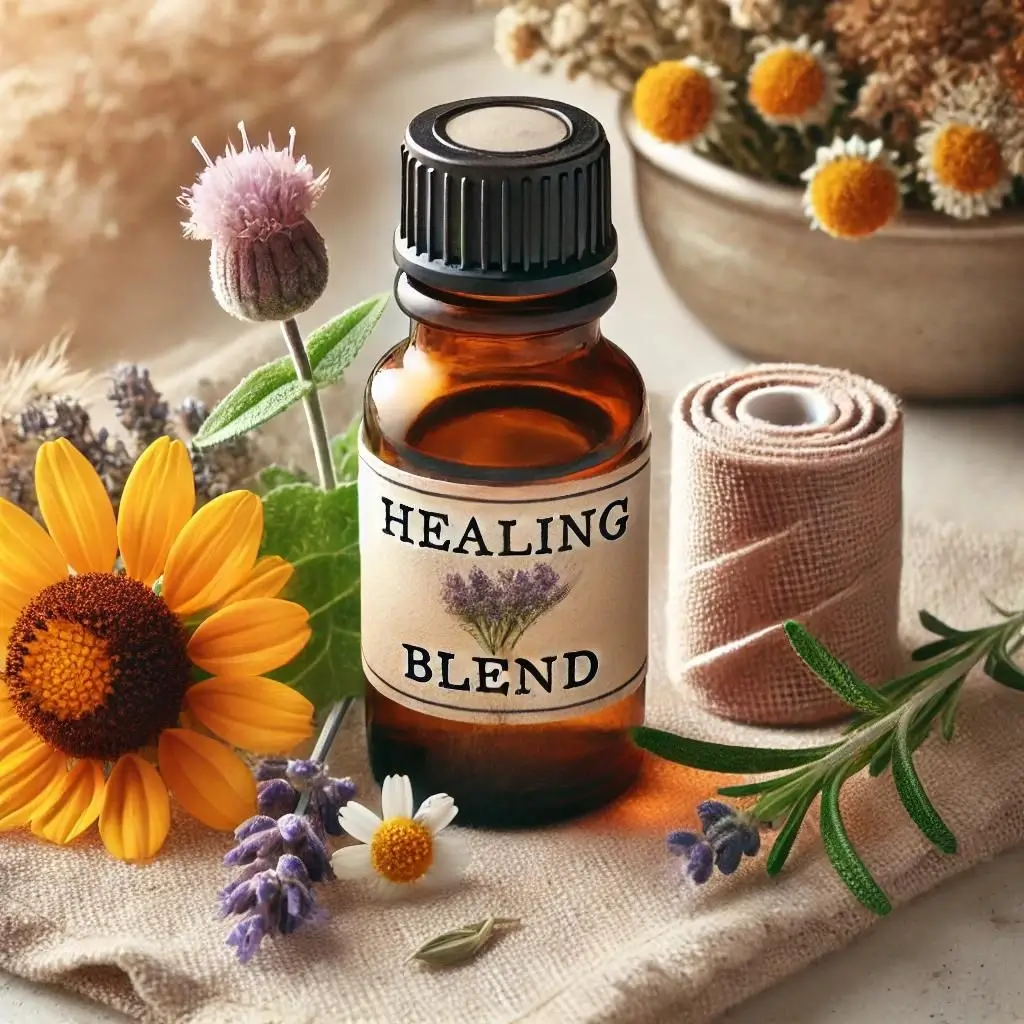Finding restful sleep can be challenging in today’s fast-paced world, but essential oils offer a natural solution to help relax the mind and body. Essential oils have been used for centuries to support better sleep by promoting relaxation and reducing stress. In this article, we will explore various sleep blend recipes using essential oils, how they work, and best practices for use. Whether you’re new to aromatherapy or a seasoned enthusiast, these recipes can help you create a peaceful nighttime routine.
What are some popular essential oil sleep blend recipes?
Essential oil sleep blends combine different oils to create a relaxing and calming effect that promotes sleep. Here are some popular recipes you can try:
1. Lavender and Chamomile Blend
- Ingredients:
- 5 drops of lavender essential oil
- 3 drops of chamomile essential oil
- 2 drops of bergamot essential oil
2. Sweet Dreams Blend
- Ingredients:
- 4 drops of cedarwood essential oil
- 3 drops of sandalwood essential oil
- 2 drops of marjoram essential oil
3. Relaxing Bedtime Blend
- Ingredients:
- 4 drops of vetiver essential oil
- 3 drops of ylang-ylang essential oil
- 2 drops of frankincense essential oil
4. Calm and Cozy Blend
- Ingredients:
- 4 drops of clary sage essential oil
- 3 drops of geranium essential oil
- 2 drops of orange essential oil
5. Peaceful Slumber Blend
- Ingredients:
- 5 drops of jasmine essential oil
- 3 drops of patchouli essential oil
- 2 drops of rose essential oil
How to Use These Blends
- Diffuser: Add the specified number of drops to your diffuser with water.
- Topical: Mix the blend with a carrier oil like coconut or jojoba oil before applying to your wrists or temples.
- Bath: Add the blend to your bathwater for a calming soak.
Table: Comparison of Essential Oil Sleep Blends
| Blend Name | Key Benefits | Ideal Use |
|---|---|---|
| Lavender and Chamomile | Soothing and calming | Diffuser/Topical |
| Sweet Dreams | Earthy and grounding | Diffuser/Topical |
| Relaxing Bedtime | Deep relaxation | Diffuser/Bath |
| Calm and Cozy | Balancing and uplifting | Diffuser/Topical |
| Peaceful Slumber | Romantic and calming | Diffuser/Bath |
Using these blends regularly as part of your bedtime routine can help enhance relaxation and improve sleep quality.

How do essential oils promote better sleep?
Essential oils promote better sleep through their natural aromatic properties, which can affect the limbic system, the part of the brain that controls emotions and the nervous system. Here’s how they work:
1. Relaxation
- Lavender: Known for its calming properties, lavender helps reduce anxiety and stress, which can lead to a more restful sleep.
- Chamomile: Often used for its soothing effects, chamomile can help relax the mind and body.
2. Stress Reduction
- Bergamot: This citrus oil is known for its ability to relieve stress and uplift mood, promoting a peaceful mind before bed.
- Clary Sage: Helps balance hormones and reduce stress, aiding in relaxation.
3. Calming the Nervous System
- Vetiver: Often called the “oil of tranquility,” vetiver has a grounding effect that calms the nervous system.
- Sandalwood: Known for its grounding and calming properties, sandalwood can help quiet the mind.
4. Enhancing Sleep Quality
- Cedarwood: Promotes the release of serotonin, which is converted into melatonin, aiding sleep.
- Ylang-Ylang: Helps reduce heart rate and blood pressure, leading to a more relaxed state.
How to Use Essential Oils for Sleep
- Diffusion: Use a diffuser to disperse the essential oils in your bedroom 30 minutes before bedtime.
- Topical Application: Dilute with a carrier oil and apply to pulse points for direct absorption.
- Inhalation: Add a few drops to a cotton ball or tissue and place it near your pillow.
By incorporating essential oils into your nighttime routine, you can create an environment conducive to restful sleep.
What safety precautions should be taken when using essential oils for sleep?
While essential oils are generally safe for use, it’s important to follow safety precautions to prevent adverse reactions. Here are some guidelines to ensure safe use:
1. Dilution
- Carrier Oils: Always dilute essential oils with a carrier oil such as coconut, jojoba, or almond oil before applying them to the skin. A safe dilution ratio is typically 2-3 drops of essential oil per tablespoon of carrier oil.
2. Patch Test
- Skin Sensitivity: Conduct a patch test before using a new essential oil blend to check for any allergic reactions. Apply a small amount to the inside of your elbow and wait 24 hours.
3. Avoid Ingestion
- Internal Use: Essential oils should not be ingested unless under the guidance of a healthcare professional.
4. Use with Caution During Pregnancy
- Pregnancy and Nursing: Consult a healthcare provider before using essential oils if you are pregnant or nursing, as some oils may not be safe during this time.
5. Keep Away from Eyes and Mucous Membranes
- Irritation: Essential oils can cause irritation if they come into contact with sensitive areas like the eyes, mouth, or nose.
6. Storage
- Proper Storage: Store essential oils in a cool, dark place, away from direct sunlight, to maintain their potency and shelf life.
Table: Essential Oil Safety Tips
| Safety Tip | Description |
|---|---|
| Dilution | Always dilute with a carrier oil before use |
| Patch Test | Test on a small area of skin for sensitivity |
| Avoid Ingestion | Do not ingest essential oils |
| Use with Caution During Pregnancy | Consult with a healthcare provider |
| Keep Away from Eyes | Avoid contact with eyes and mucous membranes |
| Storage | Store in a cool, dark place |
By following these safety precautions, you can enjoy the benefits of essential oils for sleep without any adverse effects.
How can I create a custom essential oil blend for sleep?
Creating a custom essential oil blend for sleep allows you to tailor the blend to your specific preferences and needs. Here’s a step-by-step guide:
1. Identify Your Needs
- Relaxation: Focus on calming oils like lavender, chamomile, and bergamot.
- Stress Relief: Use oils that help reduce stress, such as clary sage and ylang-ylang.
2. Choose Your Base Oils
- Common Base Oils: Lavender, chamomile, and vetiver are popular choices for sleep blends.
- Blending Notes: Consider using a combination of top, middle, and base notes for a well-rounded blend.
3. Experiment with Ratios
- Start Small: Begin with a few drops of each oil and adjust the ratios to achieve your desired scent.
- Record Your Recipe: Keep track of the number of drops and oils used to replicate successful blends.
4. Test Your Blend
- Diffuser Test: Add a few drops of your blend to a diffuser and evaluate the aroma and effects.
- Skin Test: Dilute and apply a small amount to your wrist to test for scent and sensitivity.
5. Adjust as Needed
- Modify Ratios: Adjust the amount of each oil to enhance certain effects or balance the aroma.
- Add New Oils: Introduce new oils gradually to see how they complement the existing blend.
6. Store Your Blend
- Storage: Use a dark glass bottle to store your blend and label it with the ingredients and date.
Table: Sample Custom Sleep Blend
| Oil | Drops | Notes |
|---|---|---|
| Lavender | 5 | Calming and soothing |
| Chamomile | 3 | Relaxing and gentle |
| Bergamot | 2 | Uplifting and stress-relieving |
By experimenting with different combinations, you can create a personalized essential oil blend that meets your unique needs for a restful sleep.
What are the best essential oils for sleep?
Certain essential oils are renowned for their ability to promote relaxation and improve sleep quality. Here are some of the best essential oils for sleep and their benefits:
1. Lavender
- Benefits: Lavender is widely known for its calming and relaxing properties, making it ideal for promoting sleep and reducing anxiety.
2. Chamomile
- Benefits: Chamomile is often used to soothe the mind and body, helping to ease tension and promote restful sleep.
3. Bergamot
- Benefits: This citrus oil has mood-enhancing and stress-relieving properties, which can help create a peaceful environment for sleep.
4. Vetiver
- Benefits: Vetiver is known for its grounding and calming effects, making it effective for reducing stress and anxiety before bed.
5. Cedarwood
- Benefits: Cedarwood promotes the release of serotonin, which is converted into melatonin, a hormone that regulates sleep.
6. Ylang-Ylang
- Benefits: This oil helps reduce heart rate and blood pressure, creating a sense of calm and relaxation.
7. Sandalwood
- Benefits: Sandalwood is known for its grounding and meditative properties, which can help quiet the mind and promote deep sleep.
8. Clary Sage
- Benefits: Clary sage has a calming effect on the nervous system and helps balance hormones, making it effective for promoting sleep.
Table: Best Essential Oils for Sleep
| Essential Oil | Key Benefits |
|---|---|
| Lavender | Calming and relaxing |
| Chamomile | Soothing and gentle |
| Bergamot | Uplifting and stress-relieving |
| Vetiver | Grounding and calming |
| Cedarwood | Promotes serotonin and melatonin |
| Ylang-Ylang | Reduces heart rate and blood pressure |
| Sandalwood | Grounding and meditative |
| Clary Sage | Calms the nervous system |
These essential oils can be used individually or combined to create custom sleep blends tailored to your needs.
Can essential oil blends for sleep be used with children?
Essential oil blends can be used with children to promote relaxation and better sleep, but it’s important to follow specific guidelines to ensure safety. Here are some tips for using essential oils with children:
1. Age-Appropriate Oils
- Lavender and Chamomile: These oils are generally safe for use with children and are known for their calming effects.
2. Dilution
- Higher Dilution Ratio: Use a higher dilution ratio for children, typically 1-2 drops of essential oil per tablespoon of carrier oil.
3. Patch Test
- Check for Sensitivity: Conduct a patch test on your child’s skin to check for any allergic reactions before full application.
4. Diffusion
- Shorter Diffusion Time: Use a diffuser in the child’s room for a short period, around 30 minutes before bedtime, to create a calming environment.
5. Avoid Certain Oils
- Essential Oils to Avoid: Avoid using strong oils such as peppermint, eucalyptus, and rosemary with young children, as they can be too potent.
6. Consult a Professional
- Healthcare Provider: Consult a pediatrician or aromatherapist for personalized advice on using essential oils with children.
Table: Safe Essential Oils for Children
| Essential Oil | Benefits | Age Recommendation |
|---|---|---|
| Lavender | Calming and relaxing | 3 months and up |
| Chamomile | Soothing and gentle | 3 months and up |
| Bergamot | Uplifting and stress-relieving | 2 years and up |
| Cedarwood | Promotes serotonin and melatonin | 2 years and up |
By following these guidelines, you can safely incorporate essential oils into your child’s bedtime routine to help them sleep better.
What are some diffuser recipes for a relaxing night’s sleep?
Diffusers are a popular way to use essential oils to create a calming atmosphere for sleep. Here are some diffuser recipes you can try:
1. Soothing Lavender Blend
- Ingredients:
- 4 drops of lavender essential oil
- 3 drops of chamomile essential oil
- 2 drops of bergamot essential oil
2. Tranquil Nights Blend
- Ingredients:
- 3 drops of cedarwood essential oil
- 3 drops of vetiver essential oil
- 2 drops of ylang-ylang essential oil
3. Sweet Dreams Blend
- Ingredients:
- 4 drops of sandalwood essential oil
- 3 drops of clary sage essential oil
- 2 drops of lavender essential oil
4. Restful Sleep Blend
- Ingredients:
- 3 drops of frankincense essential oil
- 3 drops of geranium essential oil
- 2 drops of chamomile essential oil
5. Peaceful Sleep Blend
- Ingredients:
- 4 drops of rose essential oil
- 3 drops of patchouli essential oil
- 2 drops of jasmine essential oil
How to Use a Diffuser
- Add Water: Fill the diffuser with water up to the fill line.
- Add Essential Oils: Add the specified number of drops from your chosen recipe.
- Turn On: Start the diffuser and let it run for about 30 minutes before bedtime.
- Enjoy: Breathe in the relaxing aroma and let it help you unwind.
Table: Diffuser Recipes for Sleep
| Recipe Name | Key Oils and Benefits |
|---|---|
| Soothing Lavender | Lavender, chamomile, bergamot (calming and soothing) |
| Tranquil Nights | Cedarwood, vetiver, ylang-ylang (grounding and calming) |
| Sweet Dreams | Sandalwood, clary sage, lavender (relaxing and balancing) |
| Restful Sleep | Frankincense, geranium, chamomile (soothing and calming) |
| Peaceful Sleep | Rose, patchouli, jasmine (romantic and calming) |
Using a diffuser with these blends can help create a tranquil environment that promotes restful sleep.
How do I apply essential oils for sleep improvement?
Applying essential oils for sleep improvement involves using various methods to maximize their calming effects. Here’s how you can incorporate them into your nighttime routine:
1. Topical Application
- Pulse Points: Dilute essential oils with a carrier oil and apply to pulse points such as wrists, temples, and the back of the neck.
- Foot Massage: Apply a diluted blend to the soles of your feet for quick absorption.
2. Diffusion
- Bedroom Diffuser: Use a diffuser to disperse essential oils in your bedroom 30 minutes before bedtime.
- Portable Diffuser: Consider a portable diffuser for travel or on-the-go relaxation.
3. Bath Soak
- Aromatic Bath: Add a few drops of essential oils to your bathwater for a soothing soak.
- Bath Salts: Combine essential oils with Epsom salts for added relaxation benefits.
4. Inhalation
- Direct Inhalation: Add a few drops of essential oil to a cotton ball or tissue and inhale deeply.
- Steam Inhalation: Add essential oils to a bowl of hot water, cover your head with a towel, and inhale the steam.
5. Pillow Spray
- DIY Pillow Spray: Mix essential oils with water and a splash of witch hazel in a spray bottle. Spritz lightly on your pillow before bed.
Table: Essential Oil Application Methods
| Method | Description | Benefits |
|---|---|---|
| Topical Application | Apply to pulse points or feet | Direct absorption and relaxation |
| Diffusion | Use a diffuser to disperse oils in the air | Calming atmosphere |
| Bath Soak | Add oils to bathwater or salts | Full-body relaxation |
| Inhalation | Inhale directly from a cotton ball or steam | Quick mood enhancement |
| Pillow Spray | Spritz on pillow for gentle aroma | Relaxing sleep environment |
By using these methods, you can effectively harness the benefits of essential oils for better sleep.
Can essential oils help with sleep disorders?
Essential oils can be a supportive tool for managing sleep disorders, although they should not replace professional medical advice. Here are ways they can help:
1. Reducing Insomnia
- Lavender: Known for its calming effects, lavender can help reduce insomnia and promote better sleep quality.
2. Alleviating Sleep Apnea
- Peppermint and Eucalyptus: These oils can help clear nasal passages, making breathing easier for those with sleep apnea.
3. Easing Restless Leg Syndrome
- Marjoram: Known for its muscle-relaxing properties, marjoram can help alleviate the discomfort of restless leg syndrome.
4. Managing Anxiety-Related Sleep Issues
- Bergamot and Clary Sage: These oils help reduce anxiety, which can interfere with sleep.
5. Balancing Circadian Rhythm
- Cedarwood and Vetiver: These oils promote the release of serotonin, which regulates sleep cycles.
How to Use Essential Oils for Sleep Disorders
- Consult a Professional: Always seek advice from a healthcare provider before using essential oils for sleep disorders.
- Regular Use: Incorporate essential oils into your nightly routine for consistent results.
Table: Essential Oils for Sleep Disorders
| Sleep Disorder | Essential Oils | Benefits |
|---|---|---|
| Insomnia | Lavender | Calming and sleep-inducing |
| Sleep Apnea | Peppermint, Eucalyptus | Clears nasal passages |
| Restless Leg Syndrome | Marjoram | Muscle relaxation |
| Anxiety-Related Sleep Issues | Bergamot, Clary Sage | Reduces anxiety and stress |
| Circadian Rhythm Imbalance | Cedarwood, Vetiver | Balances serotonin and melatonin |
While essential oils can support better sleep, they should be used as part of a comprehensive approach to managing sleep disorders.
What is the best time to use essential oil blends for sleep?
Timing is crucial when using essential oil blends for sleep to maximize their benefits. Here’s how to time your usage effectively:
1. Pre-Bedtime Routine
- 30 Minutes Before Bed: Start using essential oils about 30 minutes before bedtime to allow the aroma to create a calming atmosphere.
2. Diffusion
- Evening Diffusion: Use a diffuser in your bedroom during your evening routine, such as reading or meditating.
3. Bath Time
- Relaxing Bath: Take an aromatic bath with essential oils 1-2 hours before bed to relax your muscles and mind.
4. Inhalation
- Just Before Sleep: Use direct inhalation methods or pillow sprays just before getting into bed for immediate effects.
5. Consistency
- Regular Use: Incorporate essential oils into your nightly routine consistently for best results.
Evening Routine Tips
- Wind Down: Incorporate essential oils into activities like reading, meditation, or listening to calming music.
- Limit Screen Time: Reduce exposure to screens and electronic devices before bed to enhance relaxation.
Table: Timing for Essential Oil Use
| Activity | Recommended Time | Benefits |
|---|---|---|
| Pre-Bedtime Diffusion | 30 minutes before bed | Creates a calming environment |
| Evening Bath | 1-2 hours before bed | Relaxes muscles and mind |
| Inhalation | Just before sleep | Immediate calming effects |
| Consistent Routine | Regular nightly use | Improved sleep quality over time |
By timing your use of essential oils correctly, you can enhance their effectiveness in promoting restful sleep.
Conclusion
Essential oils offer a natural and effective way to improve sleep quality and promote relaxation. By exploring different sleep blend recipes and incorporating them into your nightly routine, you can create a peaceful environment conducive to restful sleep. Always remember to follow safety guidelines and consult a healthcare professional if you have any concerns or underlying health conditions. With the right approach, essential oils can become a valuable part of your sleep-enhancing toolkit.



